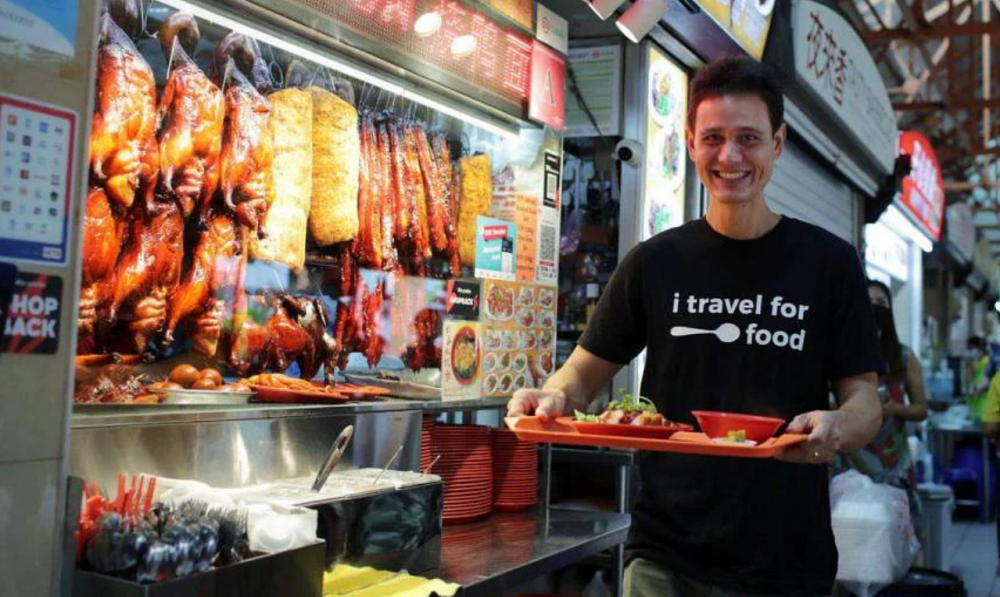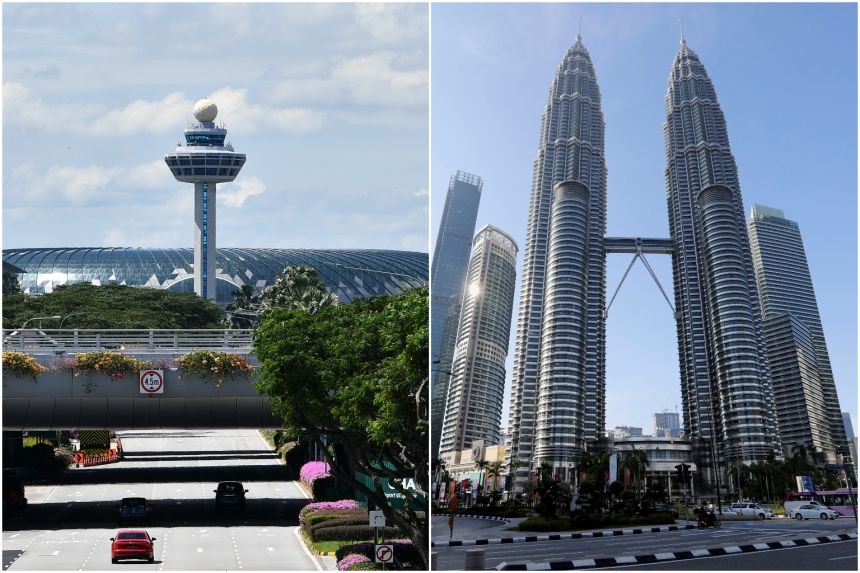Search the Community
Showing results for tags 'singapore'.
-
https://mothership.sg/2023/02/harbour-pilot-died-psa-marine/ A harbour pilot from PSA Marine (PSAM) died after falling overboard while disembarking from a tugboat to board a PSAM launch boat in waters off Singapore's Southern Islands. The pilot's body was recovered after nearly 9 hours The Maritime and Port Authority of Singapore (MPA) said in a statement that its Marine Safety Control Centre was alerted to the incident at about 2:50am on Saturday (Feb. 11). The pilot was wearing a lifejacket at the time of the incident, MPA added. MPA, Police Coast Guard (PCG) and Singapore Civil Defence Force (SCDF) immediately deployed patrol and emergency response craft to the scene to conduct search and rescue operations. MPA also activated divers to conduct an underwater search for the missing pilot and issued navigational safety broadcasts to the surrounding vessels to support the search efforts. At about 11:30am on the same day, the body of the pilot was recovered and conveyed to PCG Brani Base. Investigations are ongoing, said MPA.
- 14 replies
-
- 10
-

-

-
- psa marine
- psam
- (and 9 more)
-
Became a tourist, took a walk yesterday at Gardens by the Bay
- 147 replies
-
- 23
-

-
SINGAPORE – Local football’s Young Player of the Year Ilhan Fandi is ready to fly the coop to further his development as a player. After scoring 20 goals in 27 Singapore Premier League (SPL) and Singapore Cup matches for Albirex Niigata in 2022, Ilhan confirmed he will not be playing in next season’s SPL. But he was coy when asked about his next destination. He told The Straits Times: “I think I had a good season this year, and my goal has always been to go overseas and test myself even more in a different environment. I feel it’s best to make the move now, and everything will be finalised soon.” The 20-year-old forward is with the national team in Chiba, Japan, for their Dec 1-12 training camp in preparation for the Asean Football Federation Championship, which kicks off on Dec 20. ST understands that Belgian second-tier club KMSK Deinze is the likelier of two options for him. Deinze are eighth in the 12-team Challenger Pro League with six matches left. After a rough start this season, they have suffered just one loss in their last seven games and are the only non top-flight club in the last 16 of the Belgian Cup. This is their third season in the second tier after they gained promotion in 2020 by winning the Belgian First Amateur Division. Interestingly, Deinze were taken over in January by Singapore-based investment fund ACA Football Partners, which is hoping to make the club the centre of its multi-club ownership model. It is aiming to play in the top tier when it celebrates its 100th anniversary in 2026. Ilhan’s other option is Austin FC’s second team in the Major League Soccer (MLS) Next Pro league in the United States. The American side will launch their Next Pro team in 2023 to play in the second season of what is effectively the third tier of the US league system, below the MLS and United Soccer League Championship. Once Ilhan commits, he will become the first Singaporean footballer to ply his trade in the country he picks. He will also be following in the footsteps of his family members who had ventured overseas. His famous father Fandi Ahmad played for Dutch side Groningen (1983-1985) among other foreign teams, while older brothers Irfan and Ikhsan Fandi are now with Thailand’s BG Pathum. Ikhsan had also featured for Norway’s second-tier teams Raufoss (2019-2020) and FK Jerv (2020-2021). https://www.straitstimes.com/sport/football/football-singapore-starlet-ilhan-fandi-set-for-overseas-move?utm_campaign=stfb&utm_medium=social&utm_source=facebook
-
A new virtual telco is in town. Gorilla Mobile, a Singapore-based MVNO that unbundles rigid mobile plans into flexible, on-demand features, is now available to Singapore’s PMETs and SMEs. Its main product offering is Switch25, is a SIM-only, no-contract Corporate Individual (CIS) or SME mobile plan that helps users convert unused mobile data of their plan into “Go Tokens”, which can be redeemed for later use for co-workers - Gorilla Mobile users and non-users regardless. At launch, Gorilla Mobile offers a S$25/month mobile plan with 20GB of local mobile data, 100 minutes of talk time, and 100 SMSes. Upcoming services like global roaming travel data, Digital International Direct Dialing (IDD), and Global Office Telephony will be rolled out over the coming months. Roaming data services will be available from October 2021 onwards, or when travel restrictions are lifted, while digital IDD will be available from September 2021 onwards. Its core feature, SwitchBack, is powered on blockchain technology, where stored Go Tokens from unused portions of the plan can be used to offset bills, purchase, or exchange for other in-app services like roaming data. The MVNO also has an app (iOS, Android) for users to interact with their SwitchBack features. Stored Go Tokens have no expiry date. Go Tokens can also be transferred to both users and non-users of Gorilla Mobile, as the tokens are accessible via its app. A prime example would be IDD calling, where non-Gorilla Mobile users can use the app and the tokens they receive to make in-app overseas calls without requiring a mobile subscription or a Gorilla Mobile SIM card. Founder and CEO of Gorilla Mobile, Xanne Leo, is a new player in the virtual telco industry with over 16 years of experience in the Southeast Asian financial services scene. She is also a co-founder of Infitinus Token, a blockchain-based storage app for safekeeping data. As a virtual telco, Gorilla Mobile operates on the M1 network for network coverage, and MyRepublic for Operating Support System and Business Support System enterprise telco managed services. Signing up for Gorilla Mobile Gorilla Mobile’s Switch25 plan is a SIM-only, no-contract plan that costs S$25 per month per user. It is available to all Singapore registered companies, Singaporeans, Permanent Residents, EPass, EntrePass and SPass holders aged 21 and above. Sign-ups are available via its website here. Both individuals and businesses are entitled to a S$50 Cash Bill Difference Reward as a pre-launch promotion. Users can submit their existing telco bills to see bill differences, and port in their existing numbers to a Gorilla Switch25 plan. Activating the issued Gorilla Mobile SIM card nets a maximum of S$50 in the user’s PayNow account (amount received depends on bill difference from Gorilla’s S$25 plan). Each individual can redeem up to five Bill Difference rewards, with a maximum port-in of five numbers. The campaign starts on 18 June 2021 until 18 August 2021, 11.59 PM. Gorilla Mobile’s social media handles can be found here (Facebook, Twitter, Instagram, LinkedIn). Its official homepage can be found here. Source: https://www.hardwarezone.com.sg/tech-news-gorilla-mobile-virtual-telco-pmets-and-smes-launches-singapore
- 13 replies
-
- 1
-

-
- gorilla mobile
- telco
-
(and 1 more)
Tagged with:
-
I'm not a lawyer, so any actual lawyers here can feel free to weigh in. But anyway, of late I find myself reading up on law cases in Singapore. Apparently a lot of our court case judgements are available online to read. I find them quite interesting because sometimes the story plotline can be better than any movie or drama. I also find it quite educational to learn about criminal process, legal process and law stuff as well. I also watch shows like True Files and Crimewatch but mostly to complement what I have read about the cases I read. I've learnt quite a few things from reading about all these stuff, and I guess it might be helpful (or not) to talk about some common misconceptions about the law that people have and perhaps clear them up. Again, I'm not a lawyer, and this is just based on what I've read, so if there's any inaccuracy please feel free to jump in. I'll start with this one. Losing an appeal will see your sentence increased This is untrue. Losing your appeal does not actually affect your original sentence in any way. What actually happens is that once the original sentence is passed, the accused (by now the convicted) has a right to appeal to Court of Appeal, either to reduce the sentence, amend the charge to a lesser charge, or reverse the conviction (i.e. acquittal). At the same time, the Prosecutor also has the opportunity to appeal as well, to ask for a larger punishment if they deem the original sentence insufficient. Sometimes (but not always) this happens simultaneously. If both sides appeal at the same time then the Court of Appeal will hear both together just for convenience and to expedite the proceedings. But each appeal is judged on its own merits, and each side will have to argue their case accordingly. If the Prosecution wins their appeal it therefore means the accused would have lost his. But the Prosecution does not always enter appeal and so it's not a given that a lost appeal from the accused would result in a greater sentence. I'll add on other stuff later on if anybody is interested but let's begin with this for now.
-
McDonald's CEO Chris Kempczinski recently sent a letter to employees around the world saying the company will roll out cost-cutting programs, launch a massive restructuring, eliminate some jobs and lay off staff.
- 46 replies
-
- 2
-

-

-
- macdonald
- macdonalds
-
(and 5 more)
Tagged with:
-
https://www.channelnewsasia.com/singapore/dead-man-body-floating-water-merlion-park-retrieved-spf-scdf-police-3189876 SINGAPORE: Police are investigating after a 31-year-old man was found floating in the water off Merlion Park on Saturday (Jan 7). Authorities said they received a call for assistance at about 6.30pm. The Singapore Civil Defence Force (SCDF) also said it received a call for a water rescue at 21 Esplanade Drive at about the same time. "Upon SCDF's arrival, a body was seen floating in the water," it said. "SCDF rescuers retrieved the body from the surface of the water. "The person was pronounced dead at the scene by an SCDF paramedic." Police added that it does not suspect foul play based on preliminary investigations.
- 13 replies
-
- 10
-

-

-
https://www.channelnewsasia.com/news/singapore/income-inequality-gini-household-singapore-lowest-2019-12453450 can u spot the “fake” news by our government? How much did our median income increase by?
-
Are prices in Singapore going up and what is the Government doing about it? https://www.gov.sg/article/singapore-is-it-really-the-most-expensive-place-to-live Singapore was ranked the second most expensive city in the world by the Economist Intelligence Unit (EIU) in its Worldwide Cost of Living 2021 survey. In its ranking published on 1 December 2021, Singapore was tied in second place with Paris, up from fourth position in the previous year. However, the EIU’s findings may not reflect the cost of living of Singaporean households and here are the reasons why. First, the composition of items in the EIU consumption basket is different from the typical consumption pattern of Singaporean households. The EIU survey is designed to enable Human Resource managers around the world to calculate cost-of-living allowances and put together compensation packages for expatriates and business travellers. The EIU consumption basket is not based on the typical consumption pattern of Singaporean households and is therefore not a good gauge of cost of living for Singaporean households. For instance, the EIU consumption basket includes items such as international foreign daily newspapers that tend to be more expensive than what Singaporean households typically consume like local newspapers. A more representative indicator of cost of living in Singapore is the Consumer Price Index (CPI), which measures the average change in the prices of a basket of goods and services commonly purchased by Singaporean households. Second, the EIU survey findings were compiled by comparing the prices of goods and services across countries and converting them from their local currencies to US dollars. This means that the rankings are sensitive to currency fluctuations. However, currency fluctuations have less impact on the cost of living of Singaporeans who earn their income in Singapore dollars. Are prices in Singapore going up? Nevertheless, like many economies around the world, Singapore is seeing higher inflation lately. Inflation in recent months has been driven by both external and domestic drivers. How have prices in Singapore changed over time? Based on the CPI, prices rose by 2.9% between July and November 2021, compared to 1.5% in the first half of 2021. This follows from a 0.2% decline in prices in 2020. You can access more information on the CPI from the Singapore Department of Statistics’ website here. How is the Government helping Singaporeans to manage rising costs? 1. Manage domestic supply-side constraints. This includes managing the supply of industrial and commercial space, to help moderate business cost increases and reduce the knock-on impact on consumer prices. During the COVID-19 pandemic, the Government has also disbursed rental relief and implemented schemes such as the Wage Credit Scheme, Jobs Support Scheme and Jobs Growth Incentive Scheme to help businesses cope with costs. 2. Promote competition in markets so that Singaporeans can enjoy competitive prices. This includes lowering barriers to entry, where possible. It also entails diversifying the sources of supply, including for food, to prevent sharp price increases in the event of disruptions. 3. Shift towards an appreciating path for the trade-weighted Singapore dollar (the Singapore dollar nominal effective exchange rate or S$NEER). A stronger Singapore dollar helps to mitigate imported inflation and temper domestic cost, to ensure price stability over the medium term. 4. Implement community support programmes. The Government has worked with cooperatives such as NTUC FairPrice on programmes to help Singaporeans cope with higher prices for daily necessities. In addition, Singaporeans can tap on these support schemes: GST Voucher - For eligible Singaporeans aged 21 and above. This includes cash payouts, MediSave top-up and U-Save rebates for utilities. Grocery Voucher - For eligible Singaporeans aged 21 and above living in 1- and 2-room HDB flats. This is to support household expenses. ComCare Assistance - Targeted support for low-income households. This includes cash assistance for basic living expenses, assistance with household and medical bills, as well as employment assistance and referrals for other forms of support.
-
https://www.channelnewsasia.com/singapore/extending-quiet-period-15-hours-part-recommendations-manage-neighbourhood-noise-3089041 Extending quiet period by 1.5 hours part of recommendations to manage neighbourhood noise The panel recommended that quiet hours be extended from the current 10.30pm to 7am to between 10pm and 8am. 21 Nov 2022 01:58PM(Updated: 21 Nov 2022 02:07PM) The Community Advisory Panel (CAP) on Neighbourhood Noise submitted the recommendations to the Municipal Services Office and the Ministry of Culture, Community and Youth (MCCY) on Saturday (Nov 19) after conducting public engagements from May to September 2022. Among the recommendations is the extension of quiet hours by 1.5 hours, from the current 10.30pm to 7am. The new recommended hours would be between 10pm and 8am. CAP also urged residents to adhere to the quiet hours. OTHER RECOMMENDATIONS Other recommendations brought forward by the panel included calls for residents to resolve issues with their neighbours informally and the need for considerate behaviour outside of quiet hours. "The proposed norms from CAP called for residents to resolve issues with their neighbours through informal discussions and relationship building, instead of approaching the authorities to intervene in the first instance," said the joint press release. The panel, which was first convened in April, has proposed "a list of positive actions that residents should practise in their daily lives". Recognising that community norms alone are insufficient to address all noise disputes, CAP also recommended that the Government review the process for managing disputes over community noise, and "support it with the right enforcement powers". "This will deter offenders who deliberately create unacceptable noise, such as those who intentionally irritate their neighbours with noise, and allow stronger actions to be taken against them," it added. The suggested process included the designation of an agency to respond to and take enforcement action against neighbourhood noise issues, making mediation between neighbours mandatory, and providing greater clarity on evidence required in the resolution of disputes. The Panel also recommended the adoption of quantitative noise thresholds in the form of a decibel limit. Senior Minister of State for National Development Sim Ann, speaking at the closing dialogue for the CAP on Neighbourhood Noise, said: "We need to strike a good balance between using informal means of neighbour dispute resolution vs using hard levers such as the law and government enforcement." "On the one hand, using laws and enforcement may effectively eradicate certain problems – at least for a while. But during this process, we may lose something intangible and change the texture of society – going away from our ideals of building a more gracious, cohesive, considerate community where we can discuss problems with one another and to give and take," she said. "Let us keep our neighbours in mind when going about our daily activities, and actively work together to build a better living environment for all to enjoy," Ms Sim added. ENGAGING MORE THAN 4,000 MEMBERS OF PUBLIC The report is a culmination of the public engagements conducted by the panel from May to September 2022. The panel engaged close to 4,400 members of the public through focus group discussions, surveys, and meetings with relevant stakeholders in the drafting of the report, MCCY and the Municipal Services Office said. "While these proposals may not be an immediate solution for some of the issues, we are confident they will over time help to build a kinder and quieter Singapore for residents. "We look forward to working further with the Government on our proposals,” said Dr William Wan, Chairperson of the Community Advisory Panel on Neighbourhood Noise. Ms Sim said that the panel "raised very useful suggestions, and we will look into them seriously." "It is our intent under the Forward SG exercise to empower residents and partner the community in addressing community issues that (the) Government alone cannot resolve, particularly when it involves promoting positive community norms," she said. In a Facebook post on Saturday, Ms Sim also said, "We all need to play a part in creating a #QuieterSG." "CAP has raised several good suggestions in the report. The Government will review them seriously and provide more updates when ready," said Ms Sim in her post.
-
Saw an article by ST about popular food YouTuber Mark Wiens following his new collaboration with HBO on a new food series: Food Affair With Mark Wiens. Quite a good article to read for those who follow his channel as well. https://www.straitstimes.com/life/food/meet-mark-wiens-the-man-who-eats-his-way-to-international-fame Some food videos he shot in Singapore recently. For someone with more than 10 million subscribers, it's hard to believe that his production crew consists of only his wife and himself. Was looking forward to him opening his Pad Krapow restaurant (available in Bangkok) right here in Singapore but according to his interview with 8 Days, this isn't happening for now. Stream or download Food Affair With Mark Wiens on HBO GO from Nov 18. Is HBO free to stream?
- 23 replies
-
- 4
-

-
- mark wiens
- singapore
-
(and 1 more)
Tagged with:
-
Read in Today that Wearnes got dealership.... 2nd half of year they'll start flowing in hmm
-
Everything also can cheat. It is not only bad for our environment, but our health too. 😷 Source: https://www.straitstimes.com/singapore/transport/emission-cheating-devices-installed-in-some-trucks-and-buses-in-singapore SINGAPORE - Some diesel trucks and buses in Singapore have been fitted with devices that override the systems meant to clean up their exhaust emissions, The Straits Times has learnt. Popularly known as "defeat devices", they are sold online and allow vehicles to bypass emission standards and, in doing so, spew out high levels of nitrogen oxide - a poisonous greenhouse gas. Vehicle owners can save thousands of dollars each year by skimping on the exhaust treatment solution, known as AdBlue, which removes nitrogen oxide from diesel vehicle's exhaust emissions. At least one local workshop was found to offer an "AdBlue removal service", in addition to freelance mechanics who install such devices for a fee. In response to queries, the National Environment Agency (NEA) said it does not regulate the use of such cheat devices. But the agency, which sets vehicle emission standards here, added that it takes a serious view of devices that may bypass teh control of pollutant emissions. NEA also said it will work with inspection centres to monitor the use of such devices and enhance its regulations where necessary. It is not known how prevalent such devices are in Singapore. They are illegal in most European countries. Based on data from the Land Transport Authority, there are 172,996 diesel-powered vehicles as at Aug 31. The majority of those that are eight years old or newer would require AdBlue to operate properly. Diesel engine emissions include nitrogen oxide. When diesel vehicle is running, AdBlue, which is stored in a separate tank, is automatically injected into the exhaust system to convert the harmful fumes into nitrogen and water before the gases leave the vehicle's tailpipe. AdBlue is used in many diesel trucks and buses on Singapore roads. Globally, the exhaust treatment fluid is widely adopted by vehicle manufacturers to meet tightening emission standards. Keeping the vehicle topped up with AdBlue costs around 4 per cent to 5 per cent of the amount spent on diesel fuel. Commercial vehicles that clock high mileage will need to refill AdBlue more frequently. The solution is available at petrol stations as well as specialised AdBlue sellers. For private cars that do not cover so many kilometers, the top-up is usually done as part of the annual service at workshops. The price of Adblue is influenced by the rising cost of natural gas, a key ingredients used in its production. Currently, Adblue costs between $1.70 per litre to over $2 a litre, up 30 per cent from prices in 2021. In addition to saving on AdBlue refills, the cheat device enables the vehicle to be driven, even if the emission-control system is broken. Breakdowns can be caused by poor maintenance or by using lubricants that are meant for older diesel vehicles, which are cheaper to buy but are not suitable for these engines. Fixing such control systems is expensive. Mr Chew Guan Do, 62, who manages a fleet of trucks, said the bill easily exceeds $2,000 when control systems on the tipper trucks fail. Diesel vehicles also seem to need such repair more frequently as they age, adding downtime on top of hefty bills. There are different types of cheat devices - but their main function is to hookwink the vehicle's sensors to think there is AdBlue in the system when there is none. The simplest version of such devices, which are available online for as little as $40, plugs directly into a vehicle's diagnostic port. This type of devices, which takes the vehicle's emission-cleaning system out of play, can be removed before regular inspections. Experts said the vehicle will function normally and pass the tests, if it is otherwise roadworthy. A freelance engine-tuning expert, who spoke on the condition of anonymity, said he has programmed a truck's computer to bypass the emission control system and has not had any issues. Many of these hacks promise improved fuel efficiency and increase engine performance. With the added horsepower, the engine will produce even more poisonous exhaust gases.
-
just received a renewal notice from ICA for my son's passport. question : is there any difference if i renew now (before expiry), or apply new when this pandemic is over ? i don't think we will be seeing the light at then end of the tunnel so soon also.
-
Difficulty hiring even when offer is $18 per hour I wonder how much of that offer goes to the employment agency
-
Been happening for some time but this is a very good case where both cannot meet minimum sum https://singaporeuncensored.com/couple-divorce-so-they-can-buy-another-hdb-flat-to-earn-rental/ COUPLE DIVORCE SO THEY CAN BUY ANOTHER HDB FLAT TO EARN RENTAL ByHello Its me September 8, 2022 Bumped into an ex-colleague (who is the same age as me) earlier and had an interesting brief catch up chat over coffee. He and his wife are now divorced. But except that there is nothing wrong with their marriage and they are still living together. The sole purpose of getting the divorce is to be able to buy ANOTHER HDB FLAT (under the singles scheme). So they collectively own two HDB flats as two single individuals. You see, he was a manager that had recently been displaced by cheaper foreign labour. As all of us know, at our age, there is a real challenge in getting a job that would pay him a decent salary. Yes, there are lots of employers that wants to hire him. He is, afterall, a qualified professional with a wealth of 30 years’ experience behind him. However, these greedy employers are just not willing to pay him his worth and wants to exploit his skills and experience for a mean salary. He refused to prostitute his skills for a low salary. He end up driving a cab that (ironically) pays him more than any of the offers that he had received. He won’t be getting any of his CPF money next year because he won’t be able to meet his minimum sum. All his past CPF contributions (more than $800K) had already gone into his 5rm HDB flat that they are staying in now. His wife has some CPF left but she (too) won’t be able to get a single cent out in a few years’ time because she (too) won’t be able to meet the minimum sum as well. So they planned, got a divorce and bought a second HDB flat just before they could lock away her CPF as the minimum sum in her CPF. They then moved into the new flat and rented their older flat out legally because he had already and duly met the “Minimum Occupation Period” required for the legal renting out for that flat. And this rental income will serve an additional passive retirement income. When I asked if he would be flouting any HDB regulations by doing that, he replied, 1) They are legally divorced and they are both legally SINGLE now. 2) He can retain the existing 5rm flat under the singles scheme and his wife is eligible to buy another flat under the singles scheme. 3) There is no law in this land that prohibit two single persons (divorced or not) from living together as a couple regardless if they were previously married or not. 4) At his age, being legally married is just a marital status. It doesn’t stop them living together as man and wife. They both had made their wills. 5) Instead of having the money stuck as a minimum sum in their CPF, they might as well utilise whatever that they can get out of their CPF so as to get an alternative passive income since:- – – a) they won’t be able to get any of their CPF money anyway – – b) even when they do get their CPF monthly payouts after the age of 65 yrs old (which is still a long way to go), the amounts will be so miserable that they would hardly be able to do anything decent with it anyway… – – c) so…. they might as well get a second HDB flat with whatever money that they can siphoned out from their CPF (before the money is being locked away instead under the minimum sum)…. rent it out and (at least), the monthly rental income of $2,500 can help them live a more dignified retirement IMMEDIATELY (right away) rather than waiting till they reach 65 yrs old for that miserable delayed CPF payout that is so insignificant…. Thinking aloud now…. could this be the new norm of retirement in Singapore that Singaporeans will be planning for? Wouldn’t it be so sad that we have to come to this, in order that we can respond to how our hard-earned CPF money is being wilfully and forcefully withheld from us…
- 67 replies
-
- 9
-

-

-

-
.png)
-
- divorce
- retirement
- (and 15 more)
-
Everybody hates car accidents---- especially car owners. Usually accidents on the road are caused by the errant drivers themselves.... But what if they were caused by the passenger you just accepted? Had you known of what would soon take place to your precious vehicle, would you still have taken on this passenger? That's right; probably not--- and we bet this PHV driver thinks so too! This dash cam footage from a third-party vehicle showed the moment the passenger door swung open and right into the face of an oncoming taxi. 293443465_548259580365081_7550106539844055768_n.mp4 Oh Boy. Ouch! That, my friends, was just the sound of hearts shattering and wallets shriveling up everywhere... This shows the exact moment of impact: We can only imagine the utter horror of the driver as he heard the sickening thud of his precious Honda door, slamming into the unforgiving exterior of the Comfort Delgro taxi... Criticism incoming: Netizens took to the comment section, making their thoughts known: There were some who provided some valuable insight and advice: And one even asked the pressing question we all want to know the answer to: Naturally, we assume the passenger would be the one paying as it was their fault after all... But again, that is not always the case. One netizen made a rather aptly-worded statement: Expensive, yes, expensive indeed! The total bill for the damages appear to be as stated below: Ack! Oh my heart! How it aches for the wallet involved... What is the moral of this story, if you will? We can agree that such an incident was very unfortunate and the most gut-wrenching part? It could have been easily avoided! A little care and caution goes a long way. I am sure the passenger, taxi driver and the PHV driver would agree. I hope the PHV driver gets his repairs done soon so that he can continue to drive and pick up his passengers on the daily. After all, that is his main source of income. Isn't it astounding how one action can cause so many ripples in the course of life? Just as well, I really do hope the passenger exercises more caution in the future! Not just for their wallet's sake, but for the safety of others too! ========= Be the first to get the latest road/ COE news, and get first dibs on exclusive promos and giveaways in our Telegram SGCM Community. Join us today!
-
https://asia.nikkei.com/Spotlight/Caixin/The-double-squeeze-on-China-s-sandwich-generation The double squeeze on China's 'sandwich generation' 'Little emperors' grow up to be overburdened caregivers to parents and children Yin Fan is a single mom in her late 30s. When she was pregnant with her daughter, her father living in another city was diagnosed with the nervous system disorder multiple system atrophy and quickly lost his ability to walk. As the family's only child, she had to take care of her baby and her father alone. Yin belongs to China's first generation under the old one-child policy, those born between 1976 and 1985, also known as the "sandwich generation." Now they are trapped with the obligations of caring for their children and aging parents, putting them in financial and emotional binds. China has more than 170 million such sandwich generation families, according to Feng Xiaotian, a demographic sociology professor at Nanjing University. Growing up in the 1980s, they were often called "little emperors" as they got all the attention at home. But now they have become the most burdened generation, said Mu Guangzong, a professor at the Institute of Population Research of Peking University. In the past three decades as this generation grew up to have their own families, China has experienced a profound shift into an aging society with fewer children. From 1990 to 2021, Chinese people's average life expectancy increased from 68.6 years to 78.2. The proportion of people over 65 more than doubled to 13.5% from 5.3%. China's birthrate dropped below 1% in 2020, and the country is expected to enter a period of negative population growth by 2025. With parents living longer and with couples having their own children at an older age, the challenges facing sandwich generation families affect not only their own lives but also have ramifications for the rest of society. A family of three generations in Tianjin on July 6, 2016. Because of high housing costs, many Chinese urbanites cannot afford to bring their aging parents to the city they now call home. Expensive child care China implemented the one-child policy in 1980 to put a brake on population growth and facilitate economic expansion in a planned economy that faced severe shortages of capital, natural resources and consumer goods. The authorities eased the limit in 2016 to allow each family to have two children. Last year, after a new census showed the birthrate had stalled, China raised the cap to three children. Money, time and energy deficits are the most common worries sandwich generation families face. Childbirth, especially of a second child, is often the starting point of such crises. "This is the most stressful time for me," said Liu Li, a 37-year-old employee of a state-owned enterprise. With his wife working at a bank, they take home 20,000 yuan to 30,000 yuan ($2,900 to $4,300) each month, a decent middle-class income in a small town. But since the birth of their second child, they live paycheck to paycheck. In today's China, more and more families with stable jobs and reasonable savings are trapped in financial problems, time crunches or health difficulties due to the burden of raising children, said Zang Qisheng, a professor at Soochow University. The average cost of rearing a child until the age of 18 was 485,000 yuan in China in 2019, which was 6.9 times China's per capita GDP, much higher than in many developed countries including the U.S., France, Germany and Japan, according to a report by the YuWa Population Research Institute. The think tank was established by a group of demographers and economists, including economics professor Liang Jianzhang at Peking University. Child-rearing costs are even higher in large cities, reaching more than 1 million yuan in Shanghai and 969,000 yuan in Beijing. The pressure of raising children is mainly an economic matter, while caring for the elderly is more of a time and energy issue, said Wang Guangzhou, a researcher at the Institute of Population and Labor Economics at the Chinese Academy of Social Sciences. In the next decade, as the parents of the first generation of single-child families enter their 70s and 80s, the elder-care pressure will grow more prominent, he said. People walk by a big housing ad in Nanjing, Jiangsu province, on May 8, 2014. With the trend of late marriage and late childbearing, the double pressure of caring for the elderly while raising young children is more likely to come at the same time. According to the 2019 China General Social Survey, 27% of urban families in China include members who are 60 or older as well as children who are 14 or younger, meaning that one in four families faces this double pressure. Children first As it cares for young children and elderly parents, how will the sandwich generation allocate the family's money, time and human resources? "Children first" was the conclusion in a study based on a telephone survey of 2,439 urban families in the provinces of Guangdong, Jiangsu and Shaanxi by Sun Yat-sen University and Guangzhou University. The sandwich generation usually shows a strong sense of responsibility and urgency for its children, said Zhong Xiaohui, a professor at Sun Yat-sen University. However, in terms of elder care, most families lack clear planning and often have to respond on the fly when a parent falls seriously ill. There is a sharp contrast between their rich knowledge of childhood development and their relative ignorance of the elderly, the survey found. Children become the center of families, and parenting styles tend to be intensive or even excessive, said Yang Juhua, a professor of ethnology and sociology at Minzu University of China. As family resources are limited, it is often the elderly who make concessions, Yang said. Not only parents but also grandparents often actively shift resources to the children. To cope with the high costs of child care, the sandwich generation normally needs help from parents. Yang Mo, 61, came to Beijing from her hometown in Anhui province after retirement to help her daughter take care of her newborn. She spends 12 hours a day from 7 a.m. to 7 p.m. feeding, bathing and playing with the baby as well as cooking and cleaning before handing the child off to her daughter after work, Yang told Caixin. "I dare not get sick," she said. "Who would take care of the baby?" There were about 42 million infants under the age of 3 in China in 2021, and the nursery enrollment rate was only about 5.5%, according to the National Health Commission. The big gap means most families with infants have to rely on grandparents for child care. Child care costs account for nearly 50% of the average Chinese family's income, and 80% of children under the age of 3 are cared for by grandparents, said Yang Wenzhuang, director of the commission's Department of Population Surveillance and Family Development. As China encourages people to have more children to counter the lowest birthrate since the 1950s, this child care model of relying on grandparents might no longer work. Several studies have found that grandparents are less involved in the care of their second grandchild than the first. More and more elderly people have their own plans for retirement and are not willing to devote themselves to caring for grandchildren, said Yang at Minzu University of China. Even if they want to, aging makes them unable to, the professor said. Without grandparents' help, the burden on the sandwich generation increases, which in turn makes these families unwilling to have more children. In a 2016 survey, 60.7% of mothers who already had one child said they didn't plan to have a second because of a lack of child care. From caregivers to care receivers The more serious challenge is what happens when grandparents are not only unable to help but transition from caregivers to needing care. For the sandwich generation, the worst scenario is that their parents suddenly become severely ill or disabled, physically or mentally. "It's not only expensive but also very stressful on your mind," said Wang at the Chinese Academy of Social Sciences. "It's not like raising a child, with hope growing every day. Once an elderly person can't take care of oneself in daily life, the hope is fading every day." According to an estimate by the World Bank, China is expected to have 93 million people over the age of 75 by 2030, accounting for 6.6% of the population. By then, there will be more than 77 million disabled elderly in China, who will experience 7.44 years of disability on average, estimated Zheng Xiaoying, director of the Institute of Population Studies at Peking University. A nursing home in Jincheng, Shanxi province, on Aug. 17, 2022. Empty nesters Can a single child afford the costs of caring for two elderly parents? According to the 2020 census, 70% of the urban elderly population's income is from pensions and 17.3% from family support. Parents of the first generation of one-child families living in cities thus generally come close to supporting themselves financially, and their children's burden is not obvious, said Wu Haixia, a researcher at the Institute of Population Studies of the Chinese Academy of Social Sciences. But elderly people living in rural areas are not so lucky. In 2019, the annual pension and other income of the rural elderly was about 3,500 yuan. Most rural elderly people have to rely on family support and continue to work to get by. With the reduction of family size, the proportion of family support the elderly can rely on has been decreasing, said Nie Riming, a researcher at think tank Shanghai Institute of Finance and Law. All the data show that the rural regions are the "disaster areas" in China's aging population challenge. Nearly half the nation's over-65 population live in rural areas, according to the latest census. The trickier question is who will take care of the rural elderly. A 2014 survey by researchers at Renmin University of China found that nearly half of rural elderly were empty nesters, and 12.54% of them needed various degrees of care. The main reason for the high proportion of empty nesters in rural areas is that a large number of young and middle-aged people leave their hometowns to work in cities. When these living-alone elderly become seriously ill, half of them do not seek medical treatment because of mobility problems, being unaccompanied or because they live too far from hospitals -- in addition to financial reasons -- according to a survey by Wu at the Chinese Academy of Social Sciences. Empty nesters in cities face similar difficulties. According to Feng Xiaotian at Nanjing University, the proportion of empty nesters among the parents of first-generation only children in cities was about 60%, based on a 2015 national survey of 12 cities and a 2016 survey of five towns in Hubei Province, If a married couple's parents live in two different cities, that makes it even harder to care for all four parents at the same time, said Nie at Shanghai Institute of Finance and Law. Such cases are particularly common in megacities such as Beijing and Shanghai, where high housing cost is the first problem when children want to bring their parents to live with them, Nie said. Even for those who are able to live with their elderly parents, inadequate care is a common problem. The primary caregivers for 60% of the disabled elderly in urban areas in China are their children, but more than half of them receive care for less than 36 hours a week, according to a 2019 survey by Li Yunhua and Liu Yanan at Wuhan University's School of Politics and Public Administration. Meanwhile, it is difficult for families to find affordable professional care for disabled elderly, Zhong at Sun Yat-sen University and Peng Minggang at Guangzhou University said in a report. China provides few public elderly care services for the average family and few support measures such as subsidies and tax rebates to help families purchase market-oriented care services, they said. "Honestly speaking, it is almost a problem without a solution for the generation of only children to care for their elderly parents," a sociology scholar told Caixin. "This is the sorrow of our generation, and our parents." An elderly paralyzed person in bed at a nursing home in Shaoguan, Guangzhou province, talks to a caregiver in March 2022. Turning old themselves As the public discussion focuses on child and elder care, the needs and risks of those in the sandwich generation themselves are often overlooked. To care for their parents, many people have to quit their jobs or choose a lower-paying job with more flexibility. As a result, they suffer a sharp drop in income and the loneliness of social disconnection, Huang Chenxi, deputy dean of the School of Social Development of East China Normal University, found in interviews with caregivers for disabled and mentally ill elders in Shanghai. Elder care reduces rural women's access to nonfarm jobs by 13.5%, a negative effect that will continue to expand as the intensity of elder care increases, Fan Hongli and Xin Baoying at Shandong University of Finance and Economics found in a study. By the time their parents are in their 80s and 90s, the sandwich generation will be in their 50s and 60s. "When they bury their parents, who can they rely on?" asked Jin Jun, a sociology professor at Tsinghua University. In 2020, China's social insurance fund, which includes the basic state pension funds run by provincial-level governments, reported the first annual deficit on record. The deficit is expected to grow to 11.28 trillion yuan by 2050, when the peak of the retirement of the sandwich generation hits. Scholars have long suggested measures by the government to ease the burden on the sandwich generation. Ma Chunhua, a professor at the Institute of Sociology of the Chinese Academy of Social Sciences, called for the government to play a more active role in providing child care. "Children should be taken care of jointly by the whole society so they can grow up to take care of the whole society in the future, so as to maintain the overall operation of the economy and the continuity of the social security system," she said at a forum on the aging society. Supportive policies can't be achieved overnight, said Chen Jia, a professor at the School of Sociology of Shanghai University. For example, it took decades for Japanese families to accept a long-term care insurance system and fully reap the benefits of the system, Chen said. At the request of the interviewees, the names of Yin Fan and Yang Mo are pseudonyms.
- 69 replies
-
- 3
-

-
- generation
- sandwich
-
(and 5 more)
Tagged with:
-
https://www.straitstimes.com/business/companies-markets/tesla-lays-off-singapore-country-manager-after-elon-musk-warns-of-global-job-cuts Tesla lays off Singapore country manager after Elon Musk warns of global job cuts SINGAPORE - Tesla Singapore's country manager has been laid off as part of global job cuts that chief executive Elon Musk has warned about in recent weeks over worries about a coming recession.
- 45 replies
-
- 2
-

-

-
- tesla
- electric cars
-
(and 4 more)
Tagged with:
-
https://www.asiaone.com/singapore/i-seriously-think-our-future-f-employer-flamed-going-nuclear-prospective-intern-over? Talk about generational differences in the workplace. Except in this case, the employee hadn't even gotten the job yet. Jeffrey Koh, the owner of a design agency, took to Facebook on Thursday (Sept 15) to complain about an interviewee whom he was supposed to meet regarding her internship. He wrote, "Call me a boomer but I seriously think our future is f*****." Koh went on to share how he had "taken the time" to interview the student the next day, despite knowing that she had quit her first company after a day. "Gave her the benefit of the doubt because she actually left her internship company after working for just one day, claiming that the environment was toxic and is now looking for a new internship company." Koh, however, noted that 19 minutes after agreeing to the interview, she dropped him a message asking if it was "possible to have a virtual meeting instead". He added: "Without giving any reason, she probably figured a virtual meeting works fine too". A screengrab of their text conversation showed that five minutes after her request, Koh replied, "Don't think so. It's ok if you don't wanna come down". He ended up cancelling the interview entirely three minutes later. "On second thought, I think let's cancel the interview. All the best". Explaining his actions, Koh shared in his Facebook post: "Sarah is the very reason why I absolutely welcome foreigners who are hungry and hardworking to work here. F*** all these rules and laws protecting entitled Singaporeans." But not everyone agreed with his position.
-
Nothing beats a horror story in Singapore. Besides, records shows that horror books were the most borrowed genre in local Libraries. Remembered I was travelling in a Taxi towards Punggol new estates and the cab driver took a short cut via Buangkok instead of taking the SLE and TPE. Along the way were many new but vacant HDB blocks (except for a few occupied units) along Buangkok. Felt eerie although it was only 6 plus in the evening. The cab driver told me that the estate is haunted as many of his colleagues drove past at night and saw some paranormal "things" on the road. He also told me that a young couple wanted to return their new flat in Buangkok to HDB bcos they saw a "woman" cooking in their unit when they opened the door. Well, it is up to us whether we believe these sightings but anyhow, do you have any interesting stories to share on haunted estates in Singapore?
-
Singapore becoming a 'garbage city', says ESM Goh Chok Tong Published on Jan 29, 2015 2:57 PM 1112 364 0 0 PRINT EMAIL The scene at Meadows by the Bay after 13,000 festival goers attended the Laneway music festival over the weekend. -- ST PHOTO: ALPHONSUS CHERN By Chew Hui Min SINGAPORE - On Wednesday, Prime Minister Lee Hsien Loong called out festival goers for not picking up their litter, and asked Singaporeans to make Singapore a clean city rather than a "cleaned" one. A day later, Emeritus Senior Minister Goh Chok Tong has taken to Facebook to do the same. Comparing Tokyo and Singapore, he said that the Japanese capital had no rubbish bins in public places, but it is still litter free. "Without foreign workers, Singapore is likely to become a 'garbage city'," Mr Goh said in the post. Last Saturday, Meadows by the Bay was covered with discarded plastic ponchos, cups and other garbage after 13,000 festival goers attended the Laneway music festival there. [email protected] - See more at: http://www.straitstimes.com/news/singapore/environment/story/singapore-becoming-garbage-city-says-esm-goh-chok-tong-20150129#sthash.sQwVdhVu.dpuf
-
Comments peeps, Goat Xi Fa Cai !!
-
SINGAPORE - Vaccinated travellers will be able to take flights between Singapore and Malaysia without quarantine from Nov 29. The long-awaited reopening between the neighbouring countries will pave the way for families and friends separated by Covid-19 to reunite, as well as for workers to come in and for business links to resume. Singapore Prime Minister Lee Hsien Loong and Malaysia Prime Minister Ismail Sabri Yaakob said in a joint statement on Monday (Nov 😎 that the countries will launch the Vaccinated Travel Lane (VTL) between Changi Airport and Kuala Lumpur International Airport. The two prime ministers had spoken on the phone on Monday, and agreed that it is timely to progressively resume cross-border travel in a safe manner, given the “significant progress that both countries have made in vaccinating their respective populations and managing the Covid-19 pandemic”, said the statement. The reopening covers only air travel, and does not include land travel via the Causeway or Second Link. "The Prime Ministers also look forward to restoring travel across the land links between both countries in the near future," said the statement. Mr Lee said Singapore and Malaysia enjoy deep, warm and multi-faceted relations. The VTL will help “revive our economies, restore our people-to-people ties, and strengthen our bilateral relationship”, he added. In a Facebook post, Mr Lee said: “We are also discussing reopening travel across the Causeway and the Second Link. We look forward to launching a similar VTL scheme between Singapore and Johor in the near future.” Datuk Seri Ismail said the VTL is another important milestone in the longstanding cooperation between both countries, and that he looked forward to the effective rollout of the scheme. Singapore’s Transport Minister S Iswaran said in a Facebook post that businesses will welcome the resumption of quarantine-free travel, and citizens in both countries will be able to reunite with their loved ones after nearly two years. https://www.straitstimes.com/singapore/transport/singapore-malaysia-to-start-vtl-for-quarantine-free-air-travel-from-nov-29 Or, you could always take the VTL to Malaysia via air travel, then rent a car and drive all the way to JB for your KSL and JB lok lok and grocery shopping, then drive all the way back to KL to take a flight back to Singapore. Ok I'm kidding. Don't do it. Hahaha.
- 150 replies
-
- 15
-

-
.png)




















